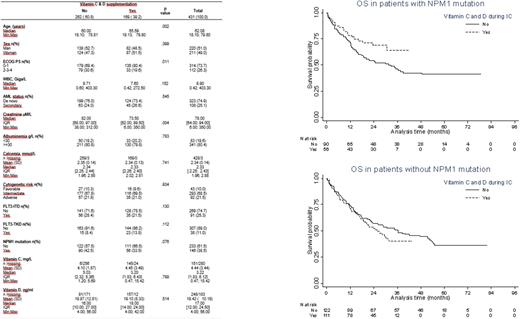Abstract
Background Vitamin (vit) deficiencies are frequently observed in patients (pts) with newly diagnosed AML (ND-AML). A lower level of vit D is associated with a worse prognosis in pts treated with intensive chemotherapy (IC) (Lee HJ, Cancer 2014). Similarly, a pretransplant vit D deficiency is associated with a higher risk of relapse (Radujkovic JCO, 2017). Moreover, preclinical studies demonstrated the antileukemic activity of vit D through the modulation of cell cycle, differenciation and apoptosis even though the clinical translation has not been successful (Cao H, Exp Hematol 2017 ; Paubelle E, Cell Rep 2020). More recent data have highlighted the role of vit C in AML. Vit C is a cofactor and increases the activity of TET2 enzyme, inducing DNA demethylation, stem cell differentiation and antileukemic activity (Agathocleous M, Nature 2017; Cimmino L, Cell 2017). Cases of remission following vit C supplementation have been reported (Foster M, Antioxidants, 2018 ; Das A, Blood Cancer J, 2019) and a small study showed that the addition of vit C to decitabine/AraC/aclarubicin/G-CSF improved outcome compared to DCAG (Zhao H, Leuk Res 2018). Based on these data, we modified our practice by adding vit C and D to the supportive care (SC) of IC.
Methods The study population included all pts with ND-AML treated by IC and registered in Toulouse DATAML from 01/2015 to 05/2020. As of March 2018, as part of the SC for AML pts treated by IC and in the absence of contra indication (renal lithiasis, renal insufficiency, G6PD deficiency, hypercalcemia), vit C (1g x 2/d, three times a week ; IV) and vit D (100,000 IU/week ; PO) have been administered from d10 until hematologic recovery of induction and consolidation. The principal objective of this retrospective study was to assess the impact of the vit supplementation on EFS. Secondary objectives were response to induction, early death, OS, RFS, incidence of relapse, vitamin levels during treatment and safety.
Results 431 pts were included, 262 without (from 01/2015 to 02/2018 ; control group) and 169 with vit C/D supplementation (03/2018-05/2020 ; vitC/D group). Data were updated on 03/03/2022. The median FU was 45.6 months. Pt characteristics were well balanced except for age, PS and creatinine (Table 1). In the vitC/D group, the median plasma level of vit C was 3.20 mg/L (range, 0.47-15.42) at diagnosis and 4.62 mg/L (range, 0.18-18.1) at time of hematologic recovery from induction (P=0.18). The level of vit D at diagnosis was 16 ng/mL (range, 4-56) and 18 ng/mL (range, 4-42) in the control and vitC/D groups, respectively. Upon recovery from induction, vit D levels significantly increased compared to diagnosis in the vitC/D group (median, 39 ng/ml, range, 5-93 ; P<0.0001).
CR/CRi rate was 84.4% (control) and 84% (vitC/D) (P=0.93). Day-30 death rate was 4.2% (control) and 2.4% (vitC/D) (P=0.31). During induction, the rates of grade 3-4 bacterial infections (vitC/D, 27.2% vs control, 35.1%, P=0.086), fungal infections (10.1 vs 18.3%, P=0.019), hemorrhages (1.8 vs 5.7%, P=0.045) or macrophage activation syndrome (1.8 vs 8.8%, P=0.002) were lower in the vitC/D group. Median level of day-21 calcemia was higher in the vitC/D group (2.48 mmol/L vs 2.44, P=0.003). Grade 2 hypercalcemia was observed in only 1 patient of the control group.
Allo-SCT was performed in 37 (26.1%) and 75 (33.9%) pts of the vitC/D and control groups, respectively. Median pretransplant vit D levels were significantly higher in the vitC/D group (33 vs 19 ng/mL, P<0.0001). There was no significant difference in EFS (vitC/D, median 13.9 vs 17.4 months, P=0.26), RFS (15.5 vs 23.5, P=0.24) and OS (30.8 vs 34.5, P=0.80) between both groups. However, multivariate analysis for OS showed a significant interaction between vitC/D and NPM1 mutation meaning that vitC/D supplementation was significantly and independently associated with better OS in pts with NPM1 mutations (HR, 0.52 ; 95%CI: 0.30-0.90, P=0.019) but not in NPM1 wildtype pts (HR, 1.01 ; 95%CI: 0.68-1.51, P=0.95). MV analysis for EFS, RFS and CIR did not find any significant interactions.
Conclusion Vit C and D supplementation is feasible and safe in AML pts during IC. Normal Vit D levels can be restored before transplant, which may be important. The potential impact of vit C/D supplementation in AML with NPM1 mutations needs further studies and pave the way for exploratory analyses to explain how the VDR pathway and/or vit C activity may interact with the biology of NPM1 mutation.
Disclosures
Bertoli:Daiichi-Sankyo: Honoraria, Membership on an entity's Board of Directors or advisory committees; Astellas: Honoraria, Membership on an entity's Board of Directors or advisory committees; AbbVie: Honoraria; BMS: Honoraria, Membership on an entity's Board of Directors or advisory committees; Jazz Pharmaceuticals: Honoraria, Membership on an entity's Board of Directors or advisory committees; Sanofi: Honoraria. Vergez:Pierre Fabre: Research Funding. Largeaud:Servier: Honoraria, Membership on an entity's Board of Directors or advisory committees. Sarry:Servier: Consultancy; Agios: Consultancy. Huguet:amgen: Honoraria; bms: Honoraria; incyte: Honoraria; novartis: Honoraria; pfizer: Honoraria; jazz pharma: Honoraria. Recher:Jazz Pharmaceuticals: Consultancy, Honoraria, Membership on an entity's Board of Directors or advisory committees, Research Funding; Novartis: Membership on an entity's Board of Directors or advisory committees; Pfizer: Membership on an entity's Board of Directors or advisory committees; Servier: Consultancy, Honoraria, Membership on an entity's Board of Directors or advisory committees; Takeda: Membership on an entity's Board of Directors or advisory committees; AbbVie, Amgen, Novartis, BMS-Celgene, Jazz Pharmaceuticals, Agios, MaatPharma, Astellas, Roche, Iqvia, Daiichi-Sankyo: Research Funding; AbbVie, Janssen, Jazz Pharmaceuticals, Novartis, BMS-Celgene, Otsuka, Astellas, Daiichi-Sankyo, Macrogenics, Roche, Takeda, Servier, Pfizer: Other: Advisory role; Astellas: Honoraria, Membership on an entity's Board of Directors or advisory committees, Research Funding; BMS: Consultancy, Honoraria, Membership on an entity's Board of Directors or advisory committees, Research Funding; AbbVie: Consultancy, Honoraria, Membership on an entity's Board of Directors or advisory committees, Research Funding; Amgen: Honoraria, Membership on an entity's Board of Directors or advisory committees, Research Funding.
Author notes
Asterisk with author names denotes non-ASH members.


This feature is available to Subscribers Only
Sign In or Create an Account Close Modal